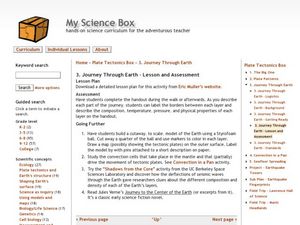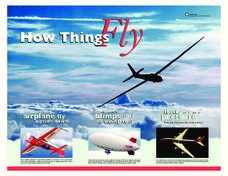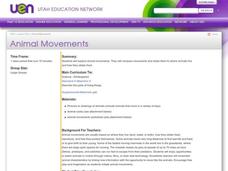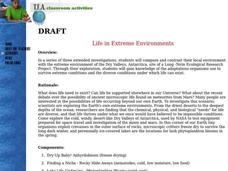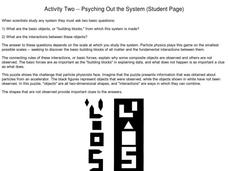Curated OER
Drawing From Nature
Students observe similarities and differences of natural objects. In this observation lesson plan, students use a magnifying glass to identify the details of objects.
Curated OER
Journey Through Earth
Students study plate tectonics. In this plate tectonics lesson students build a cutaway scale model of the Earth.
Curated OER
Matter: Build a Word
Fourth graders examine matter and the periodic table of elements. In this matter lesson, 4th graders discuss atoms and their composition. Students explore the periodic table of elements and use it to spell words out of the elements.
Curated OER
Sundials
Students investigate the different types of sundials and their history. In this shadows and time of day lesson students build their own sundials.
Curated OER
Charting Seasonal Changes
Students research the Earth's patterns of rotation and revolution, create a chart and graph of these patterns and use them to explain the causes of night and day and summer and winter.
Curated OER
Our Water Resources
Students build a model aquifer to study groundwater zones and water table formation. Students use the models to measure the movement of polluted groundwater.
Curated OER
Animal Movements
Students discuss the behavior of different animals and how they move. They explore the ways that this helps them live and find food in their environment. They participate in a game that requires them to mimic the ways in which animals move.
Curated OER
Earth's History
Seventh graders study the law of superposition by creating models of fossils in layers of rock. They examine how fossils are usually found in sedimentary rock which leads to the study of geologic history in those rocks.
Curated OER
What Can We Lose? What Do We Lose as we Gain Force With A Lever?
Third graders view a demonstration of a teeter totter as a basis for assessing pre-knowledge of a lever. They create a KwL chart. Students work in small groups to conduct a variety of experiments. The first requires students to tie books...
Curated OER
Finding Caterpillars
Students examine how animals protect themselves from predators and camouflage themselves. They participate in a simulation in which they locate red and green yarn "caterpillars," organize their data, and generate a bar graph using...
Curated OER
Animal Adaptations
students in groups to work on bulletin board, making a list of animal adaptations. They write an example of each body covering and find pictures of animals with these coverings. They mount pictures and label the covering. They should be...
Curated OER
Matter
Eighth graders explore chemical reactions and their products. They define a chemical reaction and describe the characteristics of a chemical reaction. Students classify chemical reactions.
Curated OER
How Things Fly
Students explain basic principles of aeronautics such as gravity and lift. In this How Things Fly lesson, students visit the interactive, hands-on How Things Fly gallery at the Smithsonian. Students perform three experiments that...
Curated OER
Scale Models and Wind Turbines
Students determine how to use a scale and the importance of a scale model. In this wind turbine lesson students use a method used to determine the visual impact of wind turbines.
Curated OER
Exploring Big Bang Evidence
Ninth graders study the Big Bang theory. In this big bang theory lesson students research the Internet and complete several activities and create a presentation.
Curated OER
Animal Movements
Pupils will explore animal movements. They will compare movements and relate them to where animals live and how they obtain food.
Curated OER
Washing Hands
Students read stories, conduct experiments and create graphs as they consider the importance of proper hygiene in maintaining their health. They identify the best way to wash hands and design handwashing posters for classroom placement.
Curated OER
The Difference Between Comets, Meteors And Asteroids
Students use Venn diagrams to highlight the similarities and differences between comets, meteors, and asteroids.
Curated OER
Human Needs
Pupils investigate human needs and how they have adapted to different environments. They complete an experiment to discover the effect of stress on muscles. They use the food pyramid to create a plan for healthy eating.
Curated OER
Comets And Meteor Showers
Students fill in a diagram of a comet. They listen to a short lecture, view flash animation descriptions of comets and meteors and then use the presented information to complete a worksheet.
Curated OER
Where Do We Get Clean Water?
Students investigate the concept of a filter. They use simple supplies in order to construct one after watching a demonstration performed by the teacher. An important warning that the project water is not clean for drinking is included....
Curated OER
Multiple Alleles
Students observe models of the ABO blood system including erythrocytes, antigens, and antibodies. They investigate the antigens that result from certain allele combinations and move antibodies to determine whether agglutination occurs...
Curated OER
Life in Extreme Environments
Students compare and contrast local environments with the extreme environment of the Dry Valleys, Antarctica. Students explore and gain knowledge of the adaptations organisms use to survive extreme conditions and the diverse conditions...
Curated OER
Activity Two--Psyching Out the System (Student Page) Asking Questions, Using Clues
Students observe two-dimensional shapes and work on the challenge that what is observed is as important as what is not observed.
Students determine constructions, rules and connections.
Full references listed for further reading and...



